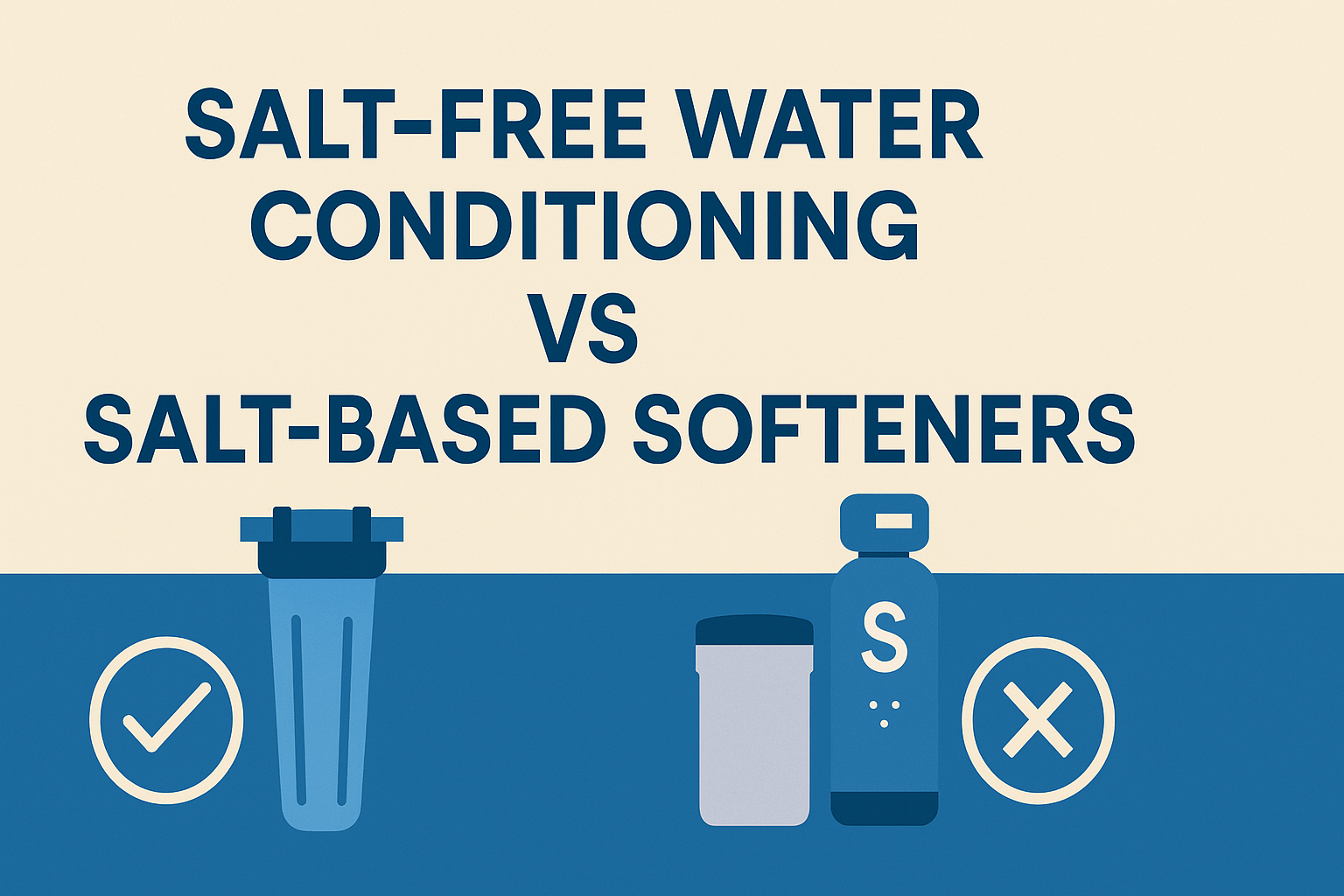— A Texas Homeowner’s Honest Guide to Better Water
Is Your Shower Water Making Your Skin Itch?
If you live in Houston, Katy, or Sugar Land, there’s a good chance you’ve felt it: dry, itchy skin after a shower… crusty white stains on your faucet… or maybe your washing machine just gave up on life too soon.
It’s not just your imagination — it’s your water.
Texas is notorious for hard, mineral-rich water loaded with chlorine, sediment, and sometimes even trace metals like lead and iron. Houston’s own water quality reports confirm high TDS (Total Dissolved Solids) and chlorine levels, while older pipes in places like Sugar Land and Missouri City can contribute to rust, VOCs, and bacteria contamination.
So the real question isn’t if you need water treatment — it’s what kind?
Let’s dive into a side-by-side look at salt-free water conditioners vs salt-based softeners, tailored for the everyday issues we Texans deal with.
💧 “My Faucets Look Like They’ve Been Dusted With Flour”: Understanding Hardness
Before you pick a system, it’s important to understand what you’re trying to fix. That weird film on your dishes? That’s calcium and magnesium buildup, the key culprits of hard water.
Salt-Based Softeners: Classic, But Salty
Salt-based systems physically remove hardness-causing minerals through ion exchange. Calcium and magnesium get swapped with sodium — it’s effective, but not without drawbacks.
✅ Pros:
- Leaves water feeling silky and “soft”
- Protects water heaters, pipes, and washing machines from mineral buildup
- Reduces soap scum and scale
🚫 Cons:
- Adds sodium to water — not ideal for those on salt-restricted diets
- Needs salt refills regularly
- Wastes water during regeneration
- May require permits or backflow preventers in Texas cities
Salt-Free Conditioners: A Gentle Middle Ground
Instead of removing minerals, salt-free systems crystallize them so they can’t stick to surfaces. Think of it as “water behavior modification.”
✅ Pros:
- No salt, no waste water
- Eco-friendly and low maintenance
- Doesn’t affect water taste or pressure
- Keeps healthy minerals intact
🚫 Cons:
- Doesn’t make water feel “soft” like traditional systems
- Less effective if your water hardness is extremely high (>25 GPG)
- Won’t remove existing scale — only prevents new buildup
If you’re seeing signs of hard water in Texas, like scale on fixtures or cloudy water, a salt-based softener may work best — but salt-free is a great low-maintenance alternative if you’re more focused on appliance life and ease of upkeep.
🛁 “Why Does My Water Smell Like a Public Pool?”: Chlorine, VOCs & Musty Odors
In Houston and surrounding areas, chlorine is added to disinfect water — but that doesn’t mean it’s safe (or pleasant) for daily use.
Many homes report a musty smell, yellow-tinted water, or even mild respiratory irritation. This is often due to:
- Chlorine & chloramines
- Volatile Organic Compounds (VOCs)
- Algae and biofilm from aging municipal pipes
Salt-based softeners? Not equipped to deal with this.
Here’s where salt-free water conditioning — especially when paired with a whole-house water filter — shines.
These systems often include carbon or catalytic media that reduce:
- Chlorine taste and odor
- VOCs and pesticides
- Organic byproducts like THMs (trihalomethanes)
📍 Did you know? The EPA allows up to 4.0 mg/L of chlorine in drinking water. Houston averages around 2.5–3.2 mg/L — well within limits, but high enough to irritate sensitive skin and affect taste.
👶 “Is This Water Safe for My Kids?”: Health, Skin, and Allergy Benefits
If your kids are prone to eczema, dry patches, or eye irritation, your tap water might be partly to blame. And if you’re constantly buying bottled water for “just in case,” that adds up fast.
Salt-Based Softeners
- Improve skin comfort by removing hardness
- Reduce soap use — good for sensitive skin
- But they don’t remove chlorine, bacteria, or heavy metals
Salt-Free + Filtration Combo
- Great for chlorine-sensitive skin and eczema relief
- Can reduce contaminants like lead, iron, and sediment
- Often the better choice for full-body wellness, especially when bathing
“Before we installed a system, my daughter would come out of the tub red and itchy,” says a Katy homeowner. “Now she can finally enjoy bath time again.”
🚿 “Why Did My Water Heater Die So Young?”: Appliance Longevity and Plumbing Protection
Hard water isn’t just annoying — it’s expensive.
Mineral buildup in your water heater’s tank can reduce efficiency by up to 48%, according to the U.S. Department of Energy. That crusty scale can:
- Destroy heating elements
- Clog pipes
- Ruin dishwashers and washing machines
Salt-based softeners offer solid scale prevention, but they don’t do much for:
- Rust in older plumbing
- Chlorine-related pipe corrosion
- Biofilm or bacterial slime buildup
Salt-free conditioners, especially when paired with a whole-house water filter, address both mineral and chemical threats — extending the life of your appliances and your plumbing.
💸 “Is It Worth It?”: Cost vs Convenience
Let’s be real. Nobody wants to drop thousands on a water system. But ignoring the problem usually ends up costing more.
Here’s a rough breakdown:
| Issue | Cost Without Treatment | Solution Cost | Long-Term Value |
|---|---|---|---|
| Replacing a water heater | $1,500–$2,500 | Softener: $1,000–$2,000 | Extend heater life 2x–3x |
| Bottled water habit | $500+/year | Salt-free + carbon system: $1,200–$1,800 | Cleaner water from every tap |
| Skin products for irritation | $200–$400/year | Either system helps | Reduce need for medicated creams |
| Plumbing repairs from scale | $300–$1,000/year | Salt-based or combo | Protects pipes and fixtures |
🧪 “So… What’s in My Water?”
Every home in Texas is different — even neighbors on the same street can get different contaminants depending on plumbing, city lines, or even HOA filtration setups.
That’s why it’s smart to get a free water test or at least look into your city’s most recent Texas tap water quality report.
Whether you’re battling chlorine in Houston water, iron stains in Katy, or just tired of hard water hassles, the right solution starts with knowing what you’re dealing with.
Final Thoughts: Salt or No Salt?
In the end, it’s not about picking sides — it’s about choosing the system that fits your family’s needs, your water profile, and your goals.
- Choose salt-based softeners if you want soft-feeling water and maximum scale protection.
- Go salt-free (ideally with filtration) if you’re eco-conscious, salt-sensitive, or battling chemical contaminants.
- Combine both for full protection — many homeowners in Texas now do.
Want to know what your water is really doing to your skin, pipes, and wallet? A quick in-home check could make all the difference. And hey — better water makes everything feel better.
P.S. Take five minutes to explore your area’s signs of hard water in Texas, or learn more about how a whole-house water filter can change your everyday experience. You deserve to love your water again.



